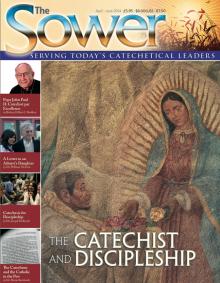Time magazine may have named both Pope John XXIII and Pope John Paul II “Man of the Year” during their respective pontificates, but this April 27, 2014—the day on which the Church celebrates Jesus’ Divine Mercy—the Church will proclaim that these holy men are saints for all time!
These two popes of the 20th century certainly provide us with stellar examples of what it means to be a disciple of Jesus Christ. Pope John XXIII is often noted for his jolliness and his ability to make people laugh. This is true; however, he is not being canonized simply for his sense of humor but for his holiness of life.
The compilation of John XXIII’s personal diaries, Journal of a Soul, “in the very nature of its prayers and its spontaneous outpourings, reveals the intimate feelings and true character of a man and priest whose transparent goodness enable us to catch a glimpse of an inner life rich in the beauty of holiness” (Introduction). The compiler, Don Loris Capovilla, goes on to advise “that it will console the hearts of men and keep them better company than many accounts of his life which may unintentionally dwindle into rhetoric and become the stuff of legend.”
It was his personal relationship with Jesus and trust in the Holy Spirit that gave him the wisdom and certainty to call the Second Vatican Council. It was his intimacy with Jesus Christ that enabled him to preside over the first sessions of Vatican II despite the fact that he was in terrible pain from stomach cancer. While he did not live to see the end of the Council and its implementation, he was able to call the Church to a profound renewal, focused on holiness, communion, and mission. And for this we are grateful.
Picking up where his predecessors left off, Pope John Paul II literally “went the extra mile,” many miles, traversing the globe to engage face-to-face with believers and non-believers, young and old, in order to draw them back to their merciful Father. Years later Pope Francis would coin a phrase that suitably describes John Paul’s own pastoral care in “taking on the smell of the sheep.” He took a genuine interest in the concerns of every country he visited and every person he met. His intimate relationship with Christ energized him for these journeys, even when his health failed him. The love of Christ was evident in the way he treated every human being with sincere respect and mercy, even to the point of sitting in the prison cell next to Mehmet Ali Agca and forgiving this man who tried to kill him.
In many ways Pope John Paul II shaped us as catechists, through his profound writings and in his moving witness. He taught us that when we are forming disciples, we ourselves must first be disciples of the Master, not just any disciples but disciples in love with Jesus—on fire for Christ. In his homily for the Jubilee of Catechists and Religion Teachers, he upheld John the Baptist (the “forerunner”) as a model for catechists, who illustrates for us the character of a disciple catechist:
First of all he is a believer personally committed to a demanding spiritual journey, consisting of attentive and constant listening to the Word of salvation. He also bears witness to a way of life that is detached and poor; he shows great courage in proclaiming God's will to everyone, even to its ultimate consequences. He does not yield to the easy temptation to take a prominent role, but humbly lowers himself to exalt Jesus.
Like John the Baptist, the catechist too is called to point out Jesus as the awaited Messiah, the Christ. His task is to invite people to fix their gaze on Jesus and to follow him, for Jesus alone is the Teacher, the Lord and the Saviour. Like the Precursor, it is Christ and not himself whom the catechist must emphasize. Everything must be directed to him: to his coming, to his presence, to his mystery. (December 10, 2000, no. 2)
In this issue of The Sower, the contributors invite you to learn what it means to be a disciple and to make disciples. Yet let us all remember that we, like these new saints, are called to holiness first, and then we call those we teach to that same holiness, which is intimacy with Jesus Christ. Pope Saint John XXIII and Pope Saint John Paul II, pray for us!
This article is originally found on page 4 of the printed edition.
This article is from The Sower and may be copied for catechetical purposes only. It may not be reprinted in another published work without the permission of Maryvale Institute. Contact [email protected]


















